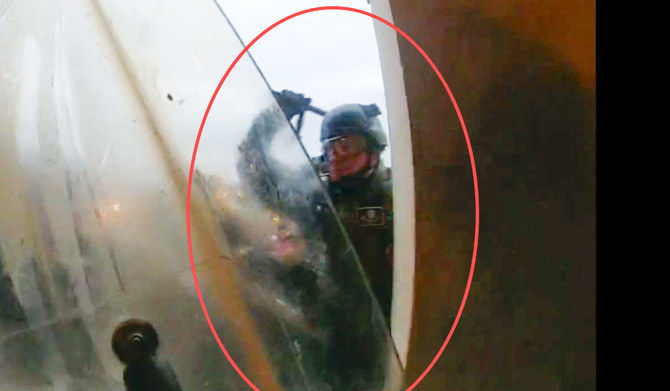WASHINGTON: A military veteran who shot and killed a handcuffed civilian in Iraq nearly 20 years ago was jailed Tuesday on charges that he used a metal baton to assault police officers during a mob’s attack on the US Capitol on Jan. 6, 2021.
Chief Judge James Boasberg agreed with prosecutors that Edward Richmond Jr., 40, of Geismar, Louisiana, is a danger to the community. Richmond initially was released after his Jan. 22 arrest.
FBI agents found an AR-15 assault rifle in Richmond’s closet when they searched his Louisiana home. Richmond is prohibited from possessing firearms after his 2004 manslaughter conviction for fatally shooting an Iraqi cow herder in the head while serving in the US Army.
“The government is concerned that, under growing pressure, he may snap again,” a prosecutor wrote in a court filing.
The judge described Richmond’s conduct at the Capitol on Jan. 6 as “pretty troubling to me.”
The prosecutor said Richmond was trying to live “off the grid” with untraceable income before his arrest on charges including civil disorder and assaulting police with a dangerous weapon. But the judge said he was less concerned about Richmond posing a flight risk, as prosecutors argued.
Last Wednesday, a federal magistrate judge in Baton Rouge, Louisiana, ordered Richmond’s release from custody. Prosecutors persuaded Boasberg to overrule the magistrate’s decision.
The judge ordered Richmond to surrender to the US Marshals Service next Monday. Richmond is the sole caregiver for his 16-year-old son. The judge agreed to give Richmond time to make arrangements for his son’s care while he is in jail.
“I know it’s important to you. It’s important to me also,” the judge told Richmond, who appeared remotely with his Louisiana-based attorney, John McLindon.
McLindon said prosecutors are relying on “antiquated incidents” in Richmond’s life to argue that he is a danger to the community.
“There is not one shred of evidence that in the last three years he has engaged in any type of violence or crimes. He has simply worked and raised his son,” the defense attorney wrote.
Richmond was 20 when an Army court-martial panel convicted him of voluntary manslaughter and sentenced him to three years of military confinement for killing Muhamad Husain Kadir in February 2004. Richmond also was dishonorably discharged from the Army.
The Army said Richmond shot Kadir in the back of the head from about six feet away after the man stumbled. Richmond testified that he didn’t know Kadir was handcuffed and believed the Iraqi man was going to harm a fellow soldier.
Richmond initially was charged with unpremeditated murder, which carries a maximum sentence of life in prison. But the panel of five officers and five enlisted soldiers reduced the charge to voluntary manslaughter.
Richmond was dressed in tactical gear when he attacked police outside the Capitol on Jan. 6, according to an FBI agent’s affidavit.
Body camera footage captured Richmond repeatedly assaulting police officers with a black baton in a tunnel on the Capitol’s Lower West Terrace, the FBI said. Police struggled for hours to stop a mob of Donald Trump supporters from entering the Capitol through the same tunnel entrance.
“January 6 was not a one-time, innocent mistake, but rather one example of a pattern of dangerous behavior; of responding to tense situations with violence,” wrote the prosecutor, Victoria Sheets.
Sheets said the rifle found in Richmond’s home was registered to his ex-wife. Prosecutors plan to charge Richmond with a crime in connection with the gun, Sheets said.
“He knows he’s not supposed to have this weapon,” she told the judge. “He knows what those weapons can do.”
A witness helped the FBI identify Richmond as somebody who had traveled to Washington with several other people to serve as a “security team” for the witness for rallies planned for Jan. 6, the affidavit says.
Over 100 police officers were injured during the riot. More than 1,200 people have been charged with federal crimes related to the Capitol attack.
Also on Tuesday, a man who blind-sided a police officer and knocked him head first over a five-foot-high ledge outside the Capitol was sentenced to six years and six months in prison. Prosecutors had recommended a prison sentence of over 11 years for Ralph Joseph Celentano III, a 56-year-old carpenter from the Queens borough of New York City.
“It was just a cowardly and despicable act that could have seriously injured the officer,” US District Judge Timothy Kelly told Celentano.
Capitol Police Officer Kenrick Ellis, a US Army veteran who served in Iraq, said he feared that he may never see his young son again after Celentano tackled him.
“I thought I was on the verge of death that day,” Ellis told the judge.
“You are not a patriot. You are a coward,” the officer told Celentano.
Celentano later turned to the officer and apologized.
“I’m terribly sorry. It was a terrible day,” he said.


























